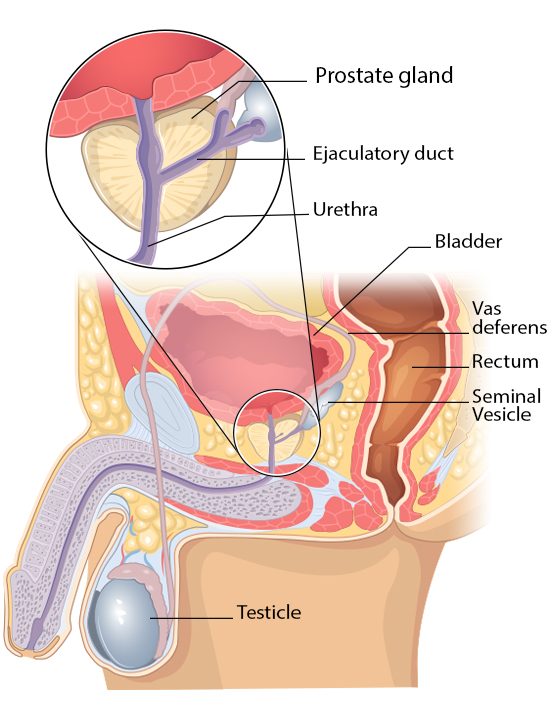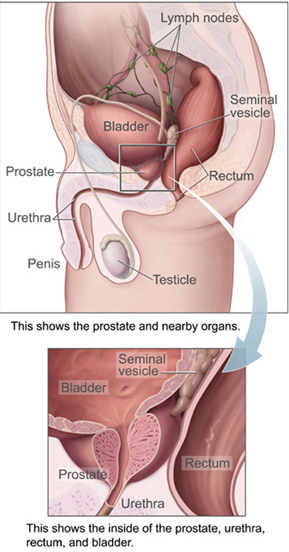What is Prostate Cancer?
Cancer in general starts when cells in the body begin to grow out of control. Cells in nearly any part of the body can become cancer cells and can then spread to other areas of the body.
Frist of all, if you will like to learn more about ways to treat your prostate using Prostate Supplement
What kind of Cancer is Prostate Cancer?
Prostate cancer is a type of cancer that affects the prostate gland, which is a small, walnut-sized gland located in the male reproductive system. It is situated just below the bladder and in front of the rectum. The prostate gland is responsible for producing and secreting some of the fluids that make up semen, which is essential for male reproduction.
The Prostate Gland.

The prostate gland is made up of different types of cells that perform different functions. The main types of cells in the prostate gland are glandular epithelial cells (Luminal cells), basal cells, neuroendocrine cells, and smooth muscle cells.
1. Glandular epithelial (Luminal) cells produce and secrete prostate fluid, which is a major component of semen.
2.Basal cells form a layer at the base of the glandular epithelial cells and provide support and nourishment to the epithelial cells.
3. Neuroendocrine cells produce hormones and neurotransmitters that help regulate the function of the prostate gland.
4. Smooth muscle cells the muscular layer of the prostate gland and help with the contraction and relaxation of the gland during ejaculation.
Types of Prostate Cancer?
Based on the type of cell affected, prostate cancer is divided into two main types.
Adenocarcinoma is the most common type of prostate cancer, accounting for more than 95% of all cases. Adenocarcinomas develop in the glandular epithelial cells that produce seminal fluid.
Neuroendocrine tumor are rare types of prostate cancer that develop from neuroendocrine cells in the prostate gland.
Prostate cancer is one of the most common types of cancer in men, particularly in older men.
According to the American Cancer Society, about 1 in 8 men will be diagnosed with prostate cancer during their lifetime. Prostate cancer is also the second most common cause of cancer death in men, after lung cancer. You might be wondering what causes cells to go out of control and cause prostate cancer? Well, Researchers do not know exactly what causes prostate cancer.
But they have found some risk factors and are trying to learn just how these factors might cause prostate cells to become cancer cells.
What Causes Prostate Cancer?
On a basic level, prostate cancer is caused by changes in the DNA of a normal prostate cell. DNA is the chemical in our cells that makes up our genes, which control how our cells function. We usually look like our parents because they are the source of our DNA. But DNA affects more than just how we look. Some genes control when our cells grow, divide into new cells, and die.
Certain genes that help cells grow, divide, and stay alive are called onco-genes. Genes that normally keep cell growth under control, repair mistakes in DNA, or cause cells to die at the right time are called tumor suppressor genes. Cancer can be caused by DNA mutations that keep oncogenes turned on, or that turn off tumor suppressor genes. DNA changes can either be inherited from a parent or can be acquired during a person’s lifetime. Additionally, one of the key risk factors for prostate cancer is age.
When are Men likely to get Prostate Cancer?
As men get older, the risk of developing prostate cancer increases. Other risk factors include family history of prostate cancer, and race. Prostate cancer is often referred to as a “silent killer” because it may not cause any symptoms in its early stages. However, as the cancer grows and spreads, it can begin to cause a variety of symptoms that may include Difficulty urinating, including a weak or interrupted urine flow, or the need to urinate more frequently. Blood in the urine or semen.

Pain or discomfort during urination or ejaculation. Pain or stiffness in the lower back, hips, or thighs. Loss of bladder or bowel control in advanced cases. Early detection of prostate cancer is key to successful treatment and management of the disease.
Detecting Prostate Cancer
There are several screening and diagnostic tests that are used to detect prostate cancer and assess its extent and severity.
The most common screening test for prostate cancer is the prostate-specific antigen (PSA) blood test. PSA is a protein that is produced by the prostate gland, and elevated levels of PSA in the blood can be a sign of prostate cancer or other prostate conditions. However, PSA levels can also be elevated due to other factors, such as benign prostatic hyperplasia (BPH) or inflammation of the prostate gland, so a high PSA test result does not necessarily mean that a person has prostate cancer. If a PSA test result is elevated, a healthcare provider may recommend further testing, such as a digital rectal exam (DRE) or a prostate biopsy. During a DRE, the healthcare provider will insert a lubricated, gloved finger into the rectum to feel for any abnormalities in the prostate gland, such as lumps or hard areas.
A prostate biopsy involves taking small tissue samples from the prostate gland using a needle, which are then examined under a microscope for the presence of cancer cells.
Other diagnostic tests that may be used to assess prostate cancer include: • Imaging tests, such as a transrectal ultrasound (TRUS), magnetic resonance imaging (MRI), or computed tomography (CT) scan, which can provide detailed images of the prostate gland and surrounding tissues. • Bone scans, which can detect the presence of cancer that has spread to the bones. • Genomic testing, which can help predict the aggressiveness of the cancer and guide treatment decisions. The choice of diagnostic tests will depend on several factors, such as the patient’s age, overall health, and the extent of the suspected cancer.
Treatment Of Prostate Cancer?
There are several treatment options available for prostate cancer, which will depend on several factors, such as the stage and grade of the cancer, the age and overall health of the patient, and the patient’s preferences and goals of treatment. The main treatment options for prostate cancer include Watchful waiting or active surveillance: In cases where the cancer is slow-growing or localized, a healthcare provider may recommend monitoring the cancer through regular PSA tests, DREs, and imaging tests, without immediate treatment. This approach may be suitable for older patients or those with other medical conditions that may make treatment risky or difficult. Surgery: Surgery involves removing the prostate gland and surrounding tissues and may be recommended for cases where the cancer is confined to the prostate gland and has not spread to other parts of the body.
The most common surgical approach is radical prostatectomy, which may be performed using traditional open surgery or minimally invasive techniques such as laparoscopy or robotic surgery.
Radiation therapy: Radiation therapy uses high-energy radiation beams to kill cancer cells and may be used as the primary treatment for localized prostate cancer or as an adjuvant treatment after surgery. Types of radiation therapy used for prostate cancer include external beam radiation therapy and brachytherapy (internal radiation therapy). Hormone therapy: Hormone therapy aims to block or lower the levels of male hormones (such as testosterone) in the body, as these hormones can stimulate the growth of prostate cancer cells. Hormone therapy may be used as a primary treatment for advanced prostate cancer or as an adjuvant therapy in combination with surgery or radiation therapy. Chemotherapy: Chemotherapy uses drugs to kill cancer cells and may be recommended for cases where the cancer has spread to other parts of the body and is not responding to hormone therapy.
Chemotherapy is usually given intravenously (through a vein) and may be given in cycles, with rest periods in between. Immunotherapy: Immunotherapy uses drugs or other substances to stimulate the immune system to recognize and attack cancer cells. Immunotherapy may be used in combination with other treatments for advanced prostate cancer. Treatment decisions will depend on several factors, and patients should discuss the risks and benefits of each treatment option with their healthcare provider before making a decision.
In some cases, a combination of treatments may be recommended to achieve the best possible outcome. For example, they are supplements that can help and act as Prostate Cancer Treatment. Check this link for more information about Prostate Cancer Treatment.
In our other articles we will discuss more ways about Male and Female Prostate Cancer.
Related Articles:
Prostate: All you need to know.
Prostate Cancer, What is Prostate Cancer? CDC gov
.
